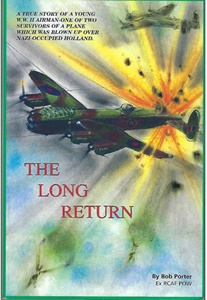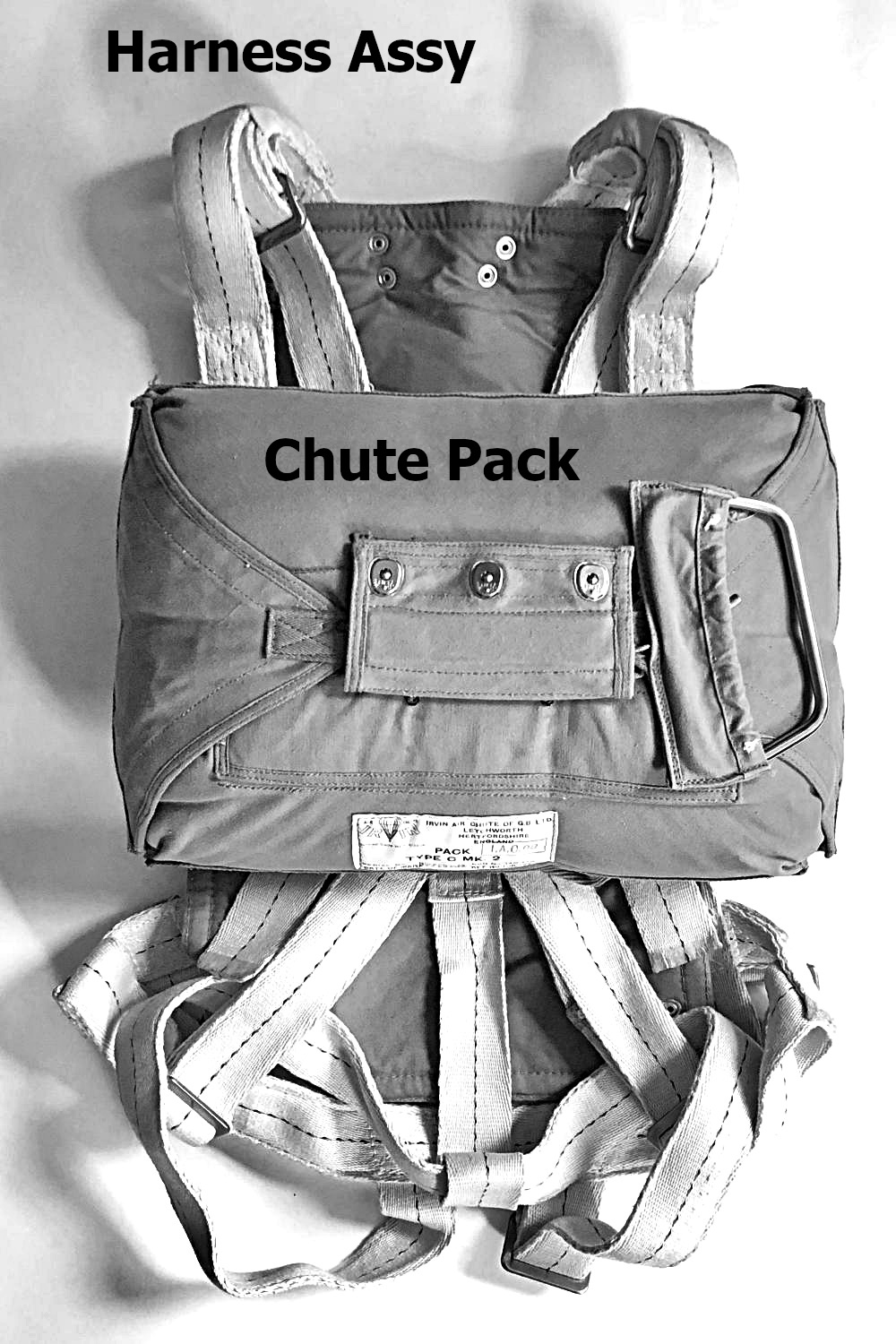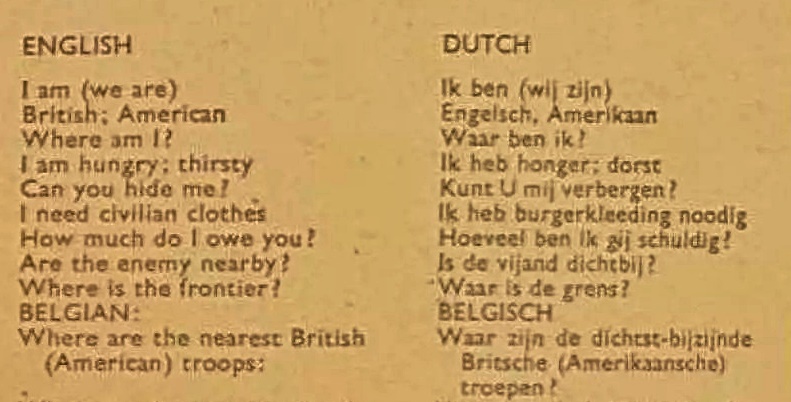
Part Two is a capsulated version of the book by Bob Porter, The Long Return.
A story of bravery, trust, human kindness in the face of possible death and the Dutch peoples heroic efforts to rescue Allied airmen.
The blast had thrown him clear of his Lancaster. He became aware that he was now in the open air of the inky dark rainy night.
He went for the handle of his parachute and it was not there. Either the blast or the force of the air pressing by him as he fell had repositioned the parachute. Porter worked out the solution while all the time he fell not knowing how much distance the ground was below. Finally locating the handle and pulling it. He stopped falling abruptly with a violent blow to his body as the chute opened above.

If you imagined these actions originated from his from full and rigorous bailout training. It was not! This was the first ever jump for Sgt. Porter, all the training had been in the confines of a classroom.
The fall ended with his chute becoming entangled in tree branches. Escaping from the harness he fell to the ground. A distance greater than he had expected. He was bruised, cut and had burns, pain from all that had happened in the minutes from the fire beginning to this latest fall all rushed at him.
In the in the distance he could hear dogs barking. This was his signal to get going far away from this area. As he was unable to do anything about the chute caught in the tree and so he left it.
He made distance between it and any point the dogs did not appear to be. Once feeling he was far enough Porter removed his Mae West, personal items and anything that could help the Germans if they caught and interrogated him. Buried them and walked off into the rainy night. It was by now shortly after two in the morning, dawn was a long ways off
German Intelligence had collected much information on Canadian airmen from articles in home town papers who covered locals who completed RCAF courses. Sometimes complete with photos and addresses or names of family, pre-war occupations. Material that could be used in interrogations.
He needed rest and stopped under the shelter of a tree. The constant rain running down his face declined him of sleep and so decided to plan out his next moves.
In his present predicament a course given by the Base Intelligence Officer came back to him. The Officer told his audience how the Germans would try and trap them during interrogation. What to say and what not to say. How to blend in with the locals if you had to. To lose the Parade Ground posture. Clandestinely watch how the locals walked, their posture and actions.
The lecture often ended on some humorous note such as For God sake do not walk up and ask someone where you can get pint a of Guinness.
Equipped with a small compass, a silk map and a very small food supply from the escape kit Porter decided to head South to the Allied lines where the landings in Normandy had taken place eleven days prior.
The Dutch resistance (Dutch: Nederlands verzet) to the German occupation of the Netherlands during World War II can be mainly characterized as non-violent. The primary organizers were the Communist Party, churches, and independent groups. Over 300,000 people were hidden from German authorities in the autumn of 1944 by 60,000 to 200,000 illegal landlords and caretakers. These activities were tolerated knowingly by some one million people, including a few individuals among German occupiers and military
The First Step to Freedom
The path ahead would require he take his chances on the roads of the Netherlands. Facing the chances of walking up to a person who may be a Nazi collaborator or a welcome helping hand.
His first attempts proved disappointing. People were frightened he might be a German in disguise trying to trick them. It might also have been that the young man and the elderly couple he had approached for help were confused by his mispronouncing of Dutch phrases.
Amongst the escape kit items was a phrase book, more of a pamphlet really, to aid evaders convey their needs to any locals they encountered. It would have been a better aide if it was shown in a phonetic representation. Most Allied airmen were not familiar with the sound of the Dutch dialect.

He waited for another opportunity. Sgt. Porter in his roughed up,burnt smelling Battle Dress jacket with insignias removed noticed a cyclist moving on the road towards him. The man, who appeared by his dress and the leather briefcase on his bicyle to be a teacher or student . He thought maybe he might take a chance. So he again tried to use his version of speaking Dutch. But to no avail. The man stared at him with a complete blank expression.
It was a tense moment both the evading airmen and the cyclist. There was a possible danger to one of the two of them losing their freedom or worse their life.
Porter decided to go for broke and showed him his Wing brevet pointed to the sky while saying RAF. The Traveller asked if he was Tommy, a term used to mean an English soldier. It brought a feeling of relief, the man at least spoke English.

The travelling cyclist asked him many direct questions. With both still uncertain of each other they rode on the same bicycle off down the road away from Zeist.
Arriving at a small town corner store he waited outside with the bicycle. As he waited two German soldiers walked by at a distance, they nodded and Bob nodded back as they continued on their way. Possibly the fact he was holding a bicycle gave him the appearance of someone who belonged. He was called into the store and met members of the Bos family the first of a number of helpers on his journey towards home. He also learned that cyclist was known as Fritz a man well known in the Underground.
The Underground needed to keep moving the Allied airmen from safe house to safe house. Not only to protect the airmen but to protect those who housed them. It was not only the SS or the Gestapo who were a danger but also collaborators who sided with the Nazi cause, nosy neighbours. Any loose lip which could bring about death to the keepers, their families and their neighbours.
The Plan
Bob Porter now clothed in Dutch fashion, moved a number of times. Getting to know and admire his new families. Not forgetting what they did to help and their sacrifice to do their part to win back Netherlands its freedom.
His next safe house was provied by a police officer named Rakers, it was unlike the former hide outs.
With the thoughts of rabbit for Christmas dinner the Rakers household had a brief respite of the war that surrounded them. For Sgt. Porter it was time for another move, his weeks before Christmas would be much different then he planned. He would be part of a planned mass evacuation of Allied evaders.
A plan possibly drawn up by fact that the Germans were now tightening up on everything and forcing young Dutchmen to be sent into Germany. The young airmen that were being hidden would now stand out. The plan was for a large group of these men travelling by bicyle were going to be smuggled through German lines with the help of a bribed German sentry.
Officer Rakers and others were against the plan. Too many men on the move and too many variables. They were correct in their assessment.
Bicycles broke down. The ferry to be used went aground and needed help pushing it off the sand. Allied airmen in disguise pushing side by side with German soldiers. The key element the bribed German Guard was replaced when he did not show up for his post.





